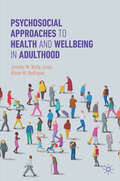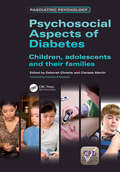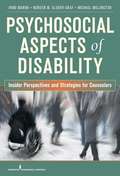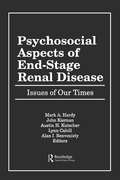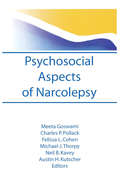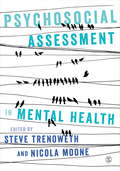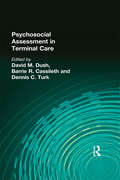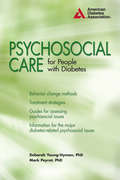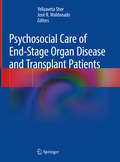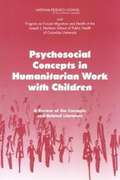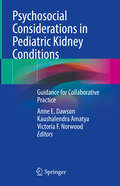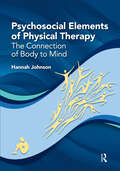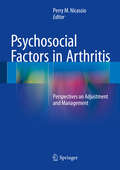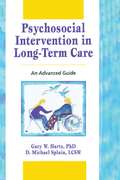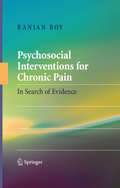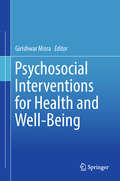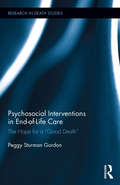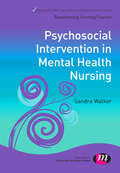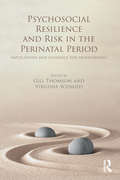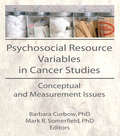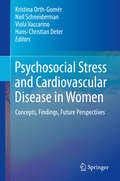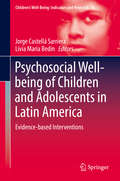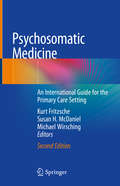- Table View
- List View
Psychosocial Approaches to Health and Wellbeing in Adulthood
by Jennifer M. Waite-Jones Alison M. RodriguezThis textbook provides an up-to-date guide to theories within psychology and sociology relevant to understanding the major life transitions within adulthood and older age and demonstrates how they can be applied in practice. In doing so, it offers a psychosocial approach that will equip readers to meet the combined physical, psychological and social needs of those in their care. In this book the impact of biological factors on adult experience is acknowledged alongside a careful exploration of the socially constructed nature of different stages of adulthood across the lifespan. In its analysis of developmental stages, the book covers key issues of current concern including emerging and early adulthood, &‘the sandwich generation&’ (those caring for both their children and their parents), later life, medicalisation, neurodiversity, long term and degenerative conditions, bereavement, and grief. Both vulnerabilities and ways to enhance resilience encouraging healthy ageing are examined. Utilising practice-oriented case studies and reflective questions it illustrates how psychosocial perspectives may be applied within family, workplace, health, and social care contexts. It offers under graduate and graduate students of social work, nursing, mental health, education, psychology, human development, gerontology and ageing, the tools needed to evaluate the interlocking psychosocial factors influencing the lives of adults at different stages of life.
Psychosocial Aspects of Diabetes: Children, Adolescents and Their Families
by Clarissa Martin Christie DeborahPart of the Paediatric Psychology series Children and young people are increasingly among those being diagnosed with diabetes. However in the UK only 1 in 6 children succeed in controlling their diabetes successfully, despite support from parents and professionals. This enlightening new book is a comprehensive account of diabetes and the complex medical and psychosocial factors that influence metabolic control in children and young people. It presents a series of evidence-based and accessible educational, psychological and social approaches to increase specialist knowledge, promote positive attitudes, enhance patient care and create appropriate healthcare environments. The book offers an easy-to-comprehend approach to clinical care and includes practical tools for assessment for all healthcare professionals throughout the text. Featuring contributions from a number of international experts in the field, this thorough and wide-ranging guide is informative reading for all students, academics and professionals with an interest in paediatric psychology and health.
Psychosocial Aspects of Disability (Fourth Edition)
by George Henderson Willie V. BryanThis new edition of Psychosocial Aspects of Disability strikes a balance of past, present, and future views of individual, family, societal, and governmental interaction and reaction to persons with disabilities. The past is presented in Part 1, Psychosocial Aspects of Disabilities, in which a view of the evolution of societal reactions to disabilities and persons with disability is presented. This perspective is important because it explains how some of the beliefs and attitudes toward disabilities and those who have a disability have developed. Additionally, Part 1 makes us aware from a historical perspective why persons with disabilities have been subject to certain types of treatment from family, friends, and society. Parts 2 and 3 provide discussion of present situations for persons with disabilities as they move toward better inclusion in society. Chapter 5 discusses the need for empowerment of persons with disabilities and how they can empower themselves. Chapter 6 discusses the need for better employment opportunities for persons with disabilities because this is a significant way of empowering persons with disabilities. Chapter 7 discusses federal legislation that has been developed to facilitate the empowerment of persons with disabilities. Part 4, Psychosocial Issues, to a large extent, represents the future for persons with disabilities. The chapters in this section discuss some disability issues that some persons with disabilities will encounter and/or by which they will be affected during the twenty-first century. Additionally, there is discussion of the need for persons with disabilities to attain the full human rights to which they are entitled.
Psychosocial Aspects of Disability: Insider Perspectives and Counseling Strategies
by Irmo Marini Noreen M. Glover-Graf Michael Jay MillingtonWhat a marvelous and amazing textbook. Drs. Marini, Glover-Graf and Millington have done a remarkable job in the design of this highly unique book, that comprehensively and very thoughtfully addresses the psychosocial aspects of the disability experience. These highly respected scholars have produced a major work that will be a central text in rehabilitation education for years to come. From the Foreword by Michael J. Leahy, Ph. D. , LPC, CRC Office of Rehabilitation and Disability Studies Michigan State University This is an excellent book, but the best parts are the stories of the disabled, which give readers insights into their struggles and triumphs. " Score: 94, 4 Stars--Doody's Medical Reviews What are the differences between individuals with disabilities who flourish as opposed to those who never really adjust after a trauma? How are those born with a disability different from individuals who acquire one later in life? This is the first textbook about the psychosocial aspects of disability to provide students and practitioners of rehabilitation counseling with vivid insight into the experience of living with a disability. It features the first-person narratives of 16 people living with a variety of disabling conditions, which are integrated with sociological and societal perspectives toward disability, and strategies for counseling persons with disabilities. Using a minority model perspective to address disability, the book focuses on historical perspectives, cultural variants regarding disability, myths and misconceptions, the attitudes of special interest and occupational groups, the psychology of disability with a focus on positive psychology, and adjustments to disability by the individual and family. A wealth of counseling guidelines and useful strategies are geared specifically to individual disabilities. Key Features: Contains narratives of people living with blindness, hearing impairments, spinal cord injuries, muscular dystrophy, polio, mental illness, and other disabilities Provides counseling guidelines and strategies specifically geared toward specific disabilities, including "dos and don'ts" Includes psychological and sociological research relating to individual disabilities Discusses ongoing treatment issues and ethical dilemmas for rehabilitation counselors Presents thought-provoking discussion questions in each chapter Authored by prominent professor and researcher who became disabled as a young adult
Psychosocial Aspects of End-Stage Renal Disease: Issues of Our Times
by Austin H. Kutscher Mark A. Hardy John Kiernan Lynn Cahill Alan I. BenvenistyThis thoughtful new book presents strategies for helping end-stage renal disease patients and their families deal with the psychosocial aspects of the chronic long-term illness. Technological advances in the treatment of this disease have offered much hope for improved quality in living which has led caregivers to have a greater concern for preserving the quality of life of their patients. In Psychosocial Aspects of End-Stage Renal Disease leaders in the field of many disciplines share knowledge and reveal problems that are still evident to them in the confrontation with this potentially fatal illness.Five comprehensive sections devote special attention to the different areas of concern for the psychosocial well-being of end-stage renal disease patients. The impact of renal disease on family relationships is covered by examining issues of family responses and coping measures such as marital and family reactions to home and hospital dialysis treatment. Ethical issues in treatment are explored, including the ethics of treatment refusal and a Jewish perspective on kidney transplants. Relations between staff and patients and a timely section on renal disease and special populations, particularly the elderly and AIDS patients, make up the final two sections of this informative volume. Professionals in all allied health disciplines will benefit from this important volume as it demonstrates a model approach, if not the definitive one, for the treatment of the psychosocial aspects of end-stage renal disease as well as other chronic illnesses.
Psychosocial Aspects of Narcolepsy
by Meeta Goswami Charles P PollakThis groundbreaking book focuses on the impact narcolepsy has on a person’s day-to-day life. It addresses the diagnosis, treatment, and management of narcolepsy with particular emphasis on psychological and social aspects of care. A multidisciplinary team of nationally and internationally respected scientists, researchers, and clinicians discuss the detrimental effects narcolepsy has on interpersonal relationships, employment, education, recreation, and other aspects of everyday life, from driving an automobile to sexual relations. Narcolepsy’s effects on these and other daily activities are often neglected in the study of the disorder. This book brings into focus the personal and social costs of narcolepsy and discusses the often enormous impact that narcolepsy can have on a person’s self-esteem and quality of life.Typically it takes about fifteen years for a person to be accurately diagnosed as having narcolepsy. Psychosocial Aspects of Narcolepsy is an aid to help caregivers and healthcare providers screen individuals with symptoms of daytime sleepiness and refer them promptly to appropriate professionals for diagnosis and help. The book helps these professionals find the most effective treatment methods and coping strategies for their patients who suffer from symptoms such as excessive daytime sleepiness, cataplexy, and hypnagogic hallucinations. Informative chapters address a wide variety of pertinent issues, including: differential diagnosis and treatment of narcolepsy the special needs of persons with narcolepsy a sociomedical model for a narcolepsy counseling service the psychosocial impact of narcolepsy on the individual and the family sociodemographic variables in narcolepsy the quality of life of persons with narcolepsy the diagnosis, treatment, and psychosocial consequences of sleep apnea the legal aspects of narcolepsy narcolepsy’s profound impact on childrenThis vital resource enables physicians and other health professionals to give optimum, comprehensive care to individuals suffering from narcolepsy. Full of informative studies and helpful coping strategies, Psychosocial Aspects of Narcolepsy belongs on the desk of every person who wants to understand the impact of narcolepsy more thoroughly and who wishes to improve the quality of life of those with the disorder.
Psychosocial Assessment in Mental Health
by Steve Trenoweth Nicola MoonePsychosocial and holistic approaches to assessment have become a central feature of modern mental health care. This practical and comprehensive book guides students through the theory and practice of psychosocial assessments to help them integrate the data as preparation for the effective planning of treatment and interventions. Key features: step-by-step guide on how to undertake each stage of the assessment process in practice clinical staff and service users voices describing their experiences of the process end of chapter exercises reflections and considerations for practice This is essential reading for pre-registration nursing students and mental health professionals.
Psychosocial Assessment in Mental Health
by Steve Trenoweth Nicola MoonePsychosocial and holistic approaches to assessment have become a central feature of modern mental health care. This practical and comprehensive book guides students through the theory and practice of psychosocial assessments to help them integrate the data as preparation for the effective planning of treatment and interventions. Key features: step-by-step guide on how to undertake each stage of the assessment process in practice clinical staff and service users voices describing their experiences of the process end of chapter exercises reflections and considerations for practice This is essential reading for pre-registration nursing students and mental health professionals.
Psychosocial Assessment in Terminal Care
by Dennis Turk Barrie Cassileth, Phd David M DushHere is one of the few books that elucidates the wide range and complexity of special concerns intrinsic to the assessment of terminally ill patients and their families. Health care experts discuss psychosocial assessment and measurement and the ability of clinicians to accurately assess and track psychosocial functioning of patients and their families. Each chapter examine specific methodological considerations in terminal care. Several important content areas are discussed at length, including assessment of pain, assessment of distress in children, evaluation of cognitive functioning, and measurement of patient and family satisfaction.
Psychosocial Care for People with Diabetes
by Mark Peyrot Deborah Young-HymanPsychosocial Care for People with Diabetes describes the major psychosocial issues which impact living with and self-management of diabetes and its related diseases, and provides treatment recommendations based on proven interventions and expert opinion. The book is comprehensive and provides the practitioner with guidelines to access and prescribe treatment for psychosocial problems commonly associated with living with diabetes.
Psychosocial Care of End-Stage Organ Disease and Transplant Patients
by Yelizaveta Sher José R. MaldonadoTh is book takes an integrated, evidence-based approach the psychiatricaspects of organ transplantation. Unlike any other text currently on the market, this title presents the core principles of transplant psychiatry through an organ-based structure that includes the heart, lungs, liver, GI organs, kidney, composite tissue, and other key areas of transplantation. Each section is divided into chapters discussing psychosocial, medical, and surgical considerations prior to and post-transplant, such as indications leading to a particular type of transplantation, medical course and complications aft er transplantation, psychiatric and psychosocial considerations before and aft er transplantation, history of each type of organ transplant, and any other special considerations. Th e text ends with special topics in care, including psychopharmacology, substance abuse, psychosocial evaluation of recipients and donors, ethical considerations, cross-cultural aspects, and building the transplant psychiatry practice. It includes excellent learning tools, including over 140 tables and figures for ease of use.Written by interdisciplinary experts, Psychosocial Care of End-Stage Disease and Transplant Patients is a valuable resource for students and medical professionals interested in psychiatry, psychology, psychosomatic medicine, transplant surgery, internists, hospital administrators, pharmacists, nurses, and social workers.
Psychosocial Concepts in Humanitarian Work with Children: A Review of the Concepts and Related Literature
by Maryanne LoughryA report on Psychosocial Concepts in Humanitarian Work with Children
Psychosocial Considerations in Pediatric Kidney Conditions: Guidance for Collaborative Practice
by Anne E. Dawson Kaushalendra Amatya Victoria F. NorwoodThis book explores the psychosocial impacts of the kidney disease process and treatments on pediatric patients, including child development, schooling, coping, and resilience. Chronic illnesses and invasive treatments can be particularly impactful on children’s development and identity formation, and a multidisciplinary treatment model that takes psychosocial considerations into account is imperative for patients’ overall wellbeing. This book covers both specific disease-related concerns, including dialysis, transplantation, and nutrition, and broader issues such as collaborating with schools, supporting families, advocacy, and the transition to adult healthcare. Written by experts in a rapidly developing area, this book is an excellent resource for all people impacted by and involved in caring for pediatric kidney diseases including practicing nephrologists and nephrologists in training, as well as psychosocial providers serving nephrology patients, and even families and patients themselves.
Psychosocial Elements of Physical Therapy: The Connection of Body to Mind
by Hannah JohnsonPhysical therapists know that their patients are more than just a list of symptoms. They are people first, often with a complex mix of medical and psychiatric circumstances, who may receive a wide range of care from a team of professionals. Keeping this in mind, Psychosocial Elements of Physical Therapy: The Connection of Body to Mind is both a textbook and a clinical resource for physical therapist students and clinicians practicing in any patient population with psychological concerns or disorders.Inside, Dr. Hannah Johnson provides an essential introduction of psychosocial concepts, general treatment approaches for culturally sensitive care, and selected classes of mental illness as defined by the Diagnostic and Statistical Manual of Mental Disorders, 5th Edition (DSM-5). A complete review of the current research and evidence base provides students a strong foundation to build their careers on, but can also act as a crash-course in the most recent literature for the busy clinician.Features: Clear, concise language and layout for efficient learning Application-based review questions Real world case studies to apply critical thinking skills Evidence-based practical tests and measures Vocabulary terms that facilitate interdisciplinary teamwork Psychosocial Elements of Physical Therapy: The Connection of Body to Mind provides physical therapist students and clinicians with an efficient yet comprehensive guide to helping patients with psychological concerns or disorders.
Psychosocial Factors in Arthritis
by Perry M. NicassioThis book provides an integrative approach for the management and care of the arthritis patient. Many different psychological, social, and behavioral factors have been shown to affect the quality of life of arthritis patients beyond the effects of the disease and the response to medications and treatments. The book establishes a biopsychosocial framework for understanding the interplay between psychological and physical aspects of rheumatic disease and summarizes the research about the psychosocial aspects that affect patients with arthritis, including stress, social support, doctor-patient communication, and sleep patterns. It explores the practice of incorporating psychological and behavioral approaches in the rheumatology clinic in order to surmount the problems of access and enhance the quality of care, promotes a comprehensive perspective on the numerous issues affecting persons with arthritis, and provides clinical guidelines for management. Psychosocial Factors in Arthritis is a valuable resource for behavioral medicine researchers, behavioral clinicians, and a range of arthritis professionals, including rheumatologists, nurses, and other allied health service practitioners.
Psychosocial Intervention in Long-Term Care: An Advanced Guide
by Gary W Hartz D Michael SplainThe responsibility of providing mental health evaluations and treatment to nursing home patients is increasingly falling on the shoulders of social services and nursing staff. Psychosocial Intervention in Long-Term Care provides the advanced techniques you, as a caregiver, need for assessing and intervening with psychosocial and behavioral problems in LTC. Targeted to students and staff who are familiar with the basic needs and problems of LTC residents, this book also describes effective ways of documenting assessments and interventions to help you integrate results into the medical record and prepare for state surveys. Psychosocial Intervention in Long-Term Care presents you with information about common mental disorders in LTC, basic counseling techniques, and the three major types of psychiatric medication. You’ll also read about legal issues in the psychosocial arena and learn how to avoid burnout while working in LTC. Best of all, this book shows you how to: use the Geriatric Depression Scale and the Mini Mental Status Exam to screen for depression and dementia design thorough behavioral assessments through use of a tracking grid use results of assessments to set up effective behavioral interventions intervene with specific psychosocial problems, such as aggression document the results of assessments develop effective Resident Assessment Inventories prepare for state surveys and develop plans of correction in response to surveysWhether you’re a graduate student or new practitioner in social work, nursing, or health care administration, you’ll appreciate this book’s practical, hands-on approach to problem solving and its focus on the biopsychosocial model. Only through a thorough assessment of residents’physical, psychological, and social needs can we design effective intervention and provide the care they deserve.
Psychosocial Interventions for Chronic Pain
by Ranjan RoyThis book fills a major gap in the practice literature for healthcare professionals engaged in providing psychosocial care for their patients suffering from chronic pain or illness. Up to now there has been little published material on evidence-based medicine in this field. Roy's book at last provides empirically derived support and understanding of psychosocial problems and explores the efficacy of the interventions available for patient care. A boon for clinical psychologists.
Psychosocial Interventions for Health and Well-Being
by Girishwar MisraThis volume provides multifaceted and multidisciplinary insights into the growing field of health studies. Providing inputs from the behavioural sciences as well as social sciences, it discusses the issues of recovery from illness, and growth and wellbeing, as situated in social and eco-cultural contexts, and addresses the modalities of health-related interventions in diverse contexts. The specific themes taken up by the contributors are post-trauma growth, resilience, gender and health, distress and wellness, indigenous healing, counselling and psychotherapy, disability-related interventions, self-healing, as well as health issues of special groups like adolescents and the elderly, cancer patients and those suffering from other chronic illnesses. Till recently, the medical model has prevailed as the chief form of understanding health and illness. This has led to marginalization of the context, localization of all health and wellness components within the individual, and to biological reductionism. The contributions to this volume propose corrective measures and provide diverse approaches in a balanced manner. This volume is useful for researchers and practitioners interested in health studies, including the behavioural sciences, social work, medical anthropology, and public health.
Psychosocial Interventions in End-of-Life Care: The Hope for a “Good Death” (Research in Death Studies #1)
by Peggy Sturman GordonThe concept of a "good death" has been hotly debated in medical circles for decades. This volume delves into the possibility and desirability of a "good death" by presenting the psychosocial measures of care as a crucial component, such as religion, existentialism, hope and meaning-making. The volume also focuses on oncologic psychiatry and the influence of technology as a means to alleviate pain and suffering, and potentially provide relief to those at the end of life. Such initiatives are aimed at diminishing pain and are socially bolstering and emotionally comforting to ensure a peaceful closure with life as opposed to a battle waged. Utilizing the most recent information from medical journals and books to present the latest on healthcare and dying today, this volume crosses the boundaries of thanatology, psychology, religion, spirituality, medical ethics and public health.
Psychosocial Interventions in Mental Health Nursing (Transforming Nursing Practice Series)
by Sandra WalkerIn order to give high quality care it is essential that mental health nurses have a solid grasp of the most common therapies and interventions used in mental healthcare. If nurses understand what the various interventions involve then they will be much better equipped to support patients through their recovery. This is a practical, engaging introduction to the major psychosocial interventions that demonstrates to students what the interventions are, why they are important and how they can be used. Key features - Interactive approach through realistic case studies that show how interventions can work to promote recovery - A patient centred approach considers the social as well as psychological aspects of mental healthcare - Each chapter is mapped to the relevant NMC standards and Essential Skills Clusters so that readers can see how they are meeting their professional requirements - Activities throughout challenge the reader to think critically and develop graduate skills
Psychosocial Resilience and Risk in the Perinatal Period: Implications and Guidance for Professionals
by Gill Thomson Virginia SchmiedBringing together experts in the field, this important book considers the underlying risk factors that create situations of psychosocial vulnerability and marginalisation for mothers, from their baby’s conception up to a year after birth. Adopting a strengths-based approach, the book looks not only at the incidence and impact of disadvantageous circumstances on women but also explores protective factors at an individual, family, community and service level. It identifies promising evidence-based interventions and sources of resilience. With a distinctive focus on social and cultural diversity, Psychosocial Resilience and Risk in the Perinatal Period considers a wide range of personal circumstances and social groups, including women’s experiences of traumatic birth, domestic and family violence, drug and alcohol use and mothering by indigenous, same-sex and disabled women. Throughout, case studies and service user experiences are used to illuminate the issues and illustrate exemplary care practice. International in scope, this book is particularly strong on the implications for care practices and health service delivery within Western models of maternity care. Its applied focus and evidence base makes it eminently suitable for study purposes and professional reference. Of relevance to midwives, health visitors and other health and social care practitioners, Psychosocial Resilience and Risk in the Perinatal Period’s final chapters focus on developing resilience amongst professionals and multiprofessional and interagency working.
Psychosocial Resource Variables in Cancer Studies: Conceptual and Measurement Issues
by Mark R Somerfield Barbara CurbowPsychosocial Resource Variables in Cancer Studies reviews the literature on selected psychosocial resource variables in cancer in order to raise and examine conceptual and methodological issues and to offer suggestions for future directions in the field. It provides investigators and clinicians with a systematic treatment of the state of the art in research on specific resource factors and provides a careful consideration of more generic methodological and statistical issues in this research context.Editors Curbow and Somerfield define resources as aspects of a person or environment that are brought to bear on the maintenance or restoration of adaptation under taxing conditions. They hope Psychosocial Resource Variables in Cancer Studies is just the beginning of an ongoing discussion within the field of psychosocial oncology on the nature and use of resource variables. The book&’s topics are crucial since researchers appear to be committed to using resource variables to explain outcomes. Also, resource variables are increasingly considered as explanatory concepts in quality-of-life research.Psychosocial Resource Variables in Cancer Studies offers critical reviews of the major resource variables investigated in contemporary psychosocial oncology research. It provides timely information on vital issues in this research, emphasizing studies of the influence of personal and social resources on adaptation to cancer. Chapters cover topics such as: the use of resource variables in the explanation of individual differences in adaptation to cancer and cancer treatment theories, measures, and methodological issues in the use of perceived control the use of the transactional model of coping to examine issues surrounding coping and the management of cancer demands religion and spirituality as resources in coping with cancer social support in adaptation to cancer and survival the clinical usefulness of research on psychosocial resources major measures of psychological functioning in psychosocial oncology research statistical and analytical issues in the use of resource variables roles of qualitative and quantitative approaches in exploring resource variablesThe editors begin with an overview of the oncology field and offer comments on issues that can be generalized to all psychosocial resource variables. Next is a presentation of a series of review papers on selected resource variables, including perceived control, coping, religion and spirituality, and social support, followed by a discussion of the clinical utility of research on these resource variables. The book concludes with a discussion of important cross-cutting methodological issues, including the selection of psychological functioning outcome measures, the statistical analysis of resource variables, and quantitative versus qualitative approaches.Psychosocial Reource Variables in Cancer is a valuable reference and guide for health psychologists, clinical health psychologists, clinical social workers in oncology, medical sociologists, medical anthropologists, and oncology nurses. It may also serve as important reading material for courses in health psychology, physiological factors in health and illness, personality and diseases, and stress and coping.
Psychosocial Stress and Cardiovascular Disease in Women
by Kristina Orth-Gomér Neil Schneiderman Viola Vaccarino Hans-Christian DeterNot long ago, it was assumed that coronary heart disease mainly--or only--affected men. Now that CHD is recognized as a leading killer of women as well as men, numerous research studies have been made of its diverse presentations in women, causal factors, and possibilities for prevention and treatment. The expert contributions to Psychosocial Stress and Cardiovascular Disease in Women span the results of this cross-disciplinary awareness. This progressive resource takes a three-dimensional approach to its subject, focusing on epidemiology and risk factors for heart disease in women, the psycho- and neurobiology of stress and coronary disease, and promising clinical interventions. Chapters identify and analyze multiple intersections of social, biological, and psychological factors in affecting women's heart health, from the social dimensions of depression to genetic/environmental interactions to the demands of balancing work and family. These wide-ranging findings will assist and motivate professionals in choosing and creating interventions, developing appropriate prevention strategies, and reducing gender-based disparities in health care. Among the topics covered: Enhancing women's heart health: a global perspective. Coronary heart disease in women: evolution of our knowledge. Gender observations on basic physiological stress mechanisms in men and women. Sleep as a means of recovery and restitution in women. LifeSkills training: benefiting both genders, for different reasons. Gender considerations in psychosocial-behavioral interventions for coronary heart disease. In particular this book will be helpful for cardiologists and other clinicians who may ask themselves why patients do not seem to make rational choices. "Why do patients not follow the advice they are offered?" is a common complaint. The role of psychosocial stress for patient compliance and adherence can be traced throughout the volume. It is emphasized in the chapters on psychosocial interventions along with other tangible and conceptual suggestions and experiences with psychosocial stress and life style change. Psychosocial Stress and Cardiovascular Disease in Women offers a deep practical level of understanding of this epidemic to help expand the work of health and clinical psychologists, sociologists, cardiologists, primary care physicians, and epidemiologists.
Psychosocial Well-being of Children and Adolescents in Latin America: Evidence-based Interventions (Children’s Well-Being: Indicators and Research #16)
by Jorge Castellá Sarriera Lívia Maria BedinThis book discusses child well-being, with children and adolescents as key informants, from a Latin American perspective. It explores theoretical and empirical issues related to well-being and associated aspects, in order to understand the well-being of this population. Topics analyzed in this volume address for instance environment and community, rights, leisure time, technologies, interpersonal relationships and spirituality and their implications for changes in the well-being in children and adolescents. Especially relevant for scholars and professionals in the social and health sciences, as well as policy makers, seeking to promote child well-being, regardless of the area in which they operate.
Psychosomatic Medicine: An International Guide for the Primary Care Setting
by Kurt Fritzsche Michael Wirsching Susan H. McDanielNow in its fully revised and expanded second edition, this volume is the definitive global resource on psychosocial problems. Containing several new chapters and featuring extensively updated contributions from experts in the field, this title takes a uniquely global approach in laying the foundations of bio psychosocial basic care and provides relevant information about the most common mental and psychosomatic problems and disorders. An extension of the cultural aspects of the individual clinical pictures and new contributions from China, Latin America, Russia, Iran, India, Africa and Myanmar, also about migration and mental health accompany this revision.This book is divided into four sections and begins by explaining the relationship between psychosomatic medicine and primary care. The next part outlines the best practices for diagnosing the most common biopsychosocial problems and mastering the most frequent communication challenges (e.g. biopsychosocial anamnesis, breaking bad news, dealing with difficult patients, family and health systems communication and collaboration). The following section delves into more specific psychosomatic problems such as depressive disorders, posttraumatic stress disorder, addiction, the terminally ill patient and eating disorders, among others. The final section focuses on developing psychosomatic medicine in international settings. Every chapter integrates basic theoretical background and practical skills and includes trans-culturally sensitive material, important for work with patients from different nations. Psychosomatic Medicine: An International Primer for the Primary Care Setting, second edition is a must-have reference for doctors from various specialties as well as nursing staff, social workers and clinical health psychologists.
